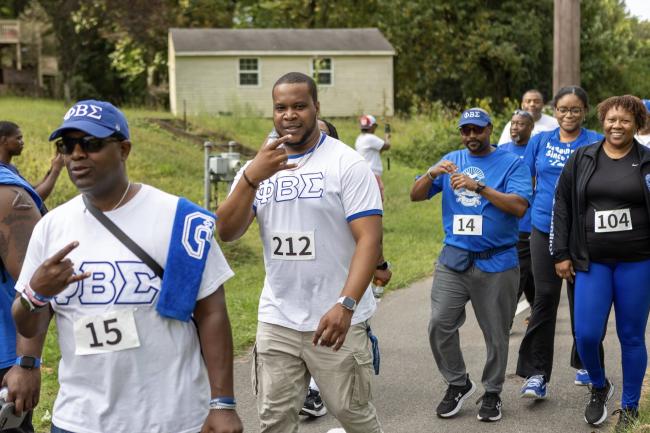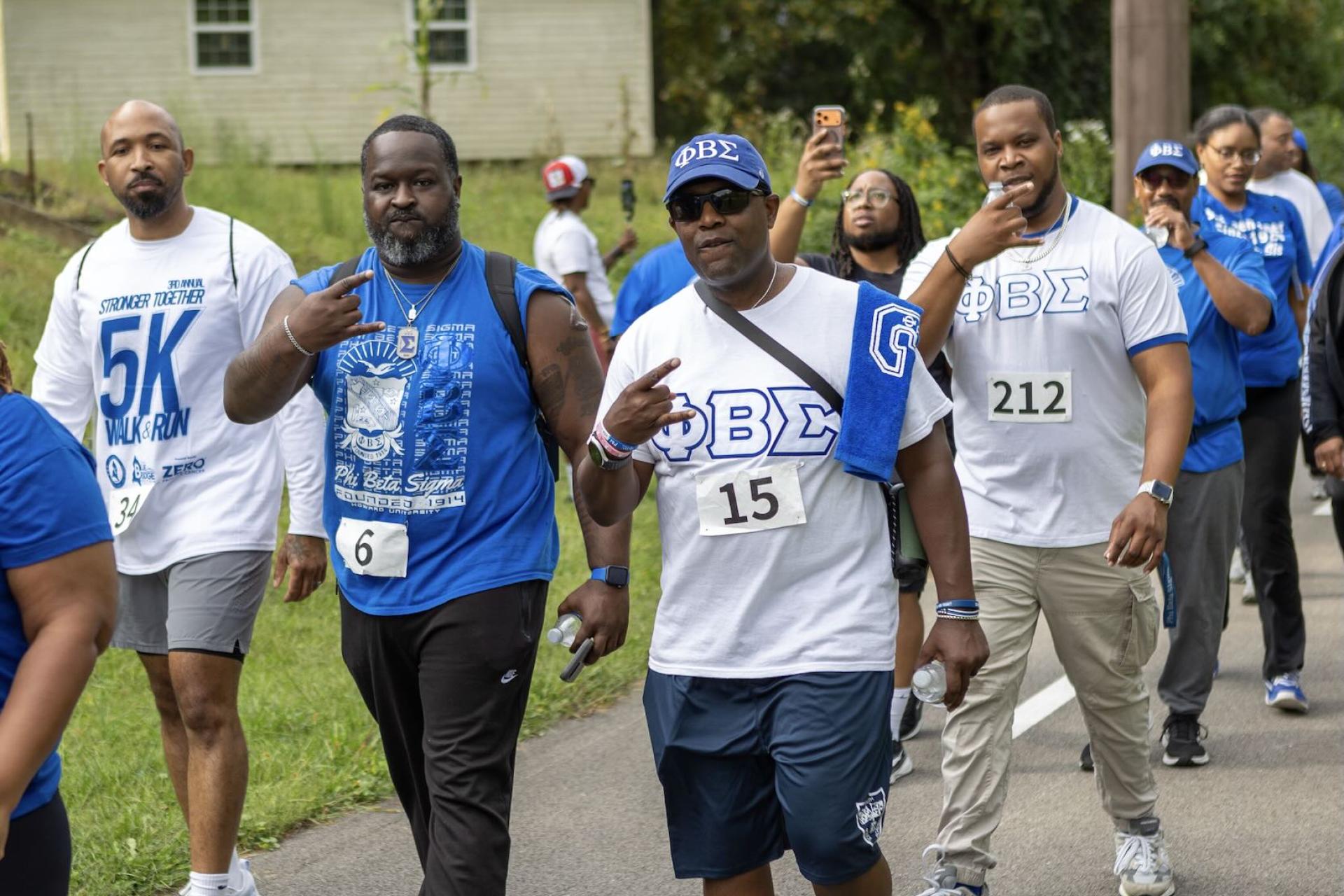
Having prostate cancer is not a death sentence. It can actually be a life sentence. But only if you take the time to get tested, follow the protocols, and share your story so others can survive too.
Editor’s Note: This story launches Howard University’s Cancer Awareness Series, highlighting the people, partnerships, and programs driving innovation in cancer research, prevention, and care. From groundbreaking research to community outreach and education about early screenings, Howard’s commitment to fighting cancer extends far beyond campus.
Photos are courtesy of photographers Damian Barton and Lee Bonds.
On an early Saturday morning, Sept. 20, at Prince George’s County’s Glenn Dale Community Center, hundreds gathered for the Stronger Together Prostate Cancer Awareness 5K Walk/Run — a community initiative of the Zeta Chi Sigma Chapter of Phi Beta Sigma Fraternity Inc. and ZERO Prostate Cancer.
The Howard University Cancer Center has spent decades building partnerships to address prostate cancer disparities—working with Black churches, fraternities, and community organizations across the region to educate and screen thousands of men. Through its Men Take Ten program, the center promotes annual screenings and early detection for men in the community, with a focus on reducing mortality among Black men.
According to the Prostate Health Education Network (PHEN), the nation’s leading prostate cancer education and advocacy organization focused on African American men, prostate cancer remains the most commonly diagnosed cancer among men in the United States. About one in six Black men will develop the disease, with rates of diagnosis more than 70% higher than those of white men and more than twice the risk of dying from it.
That tradition of collaboration, built around the Men Take Ten program, was on full display at this year’s walk, where the Cancer Center strengthened its partnership by bringing its mobile screening unit to the trailhead. The on-site Prostate-Specific Antigen (PSA) blood testing and health education marked a major step forward for the three-year-old event — helping it “level up” from a local community gathering to a regional movement for men’s health and awareness.
The “Stronger Together” community walk has become a symbol of the growing effort to raise awareness among African American men about prostate cancer and the importance of early detection.
Beyond the 5K, the Howard University Cancer Center maintains a steady presence in the community. Over the summer, the Men Take Ten program partnered with the Prostate Health Education Network to screen 181 men across five different church events between June and July. In a separate effort, Howard teamed up with American Airlines’s Professional Women in Aviation inititiave, where staff and volunteers screened 40 male airport workers in one day. Each event drew support from Howard medical students and community volunteers, continuing the university’s tradition of linking education, research, and service in real time.
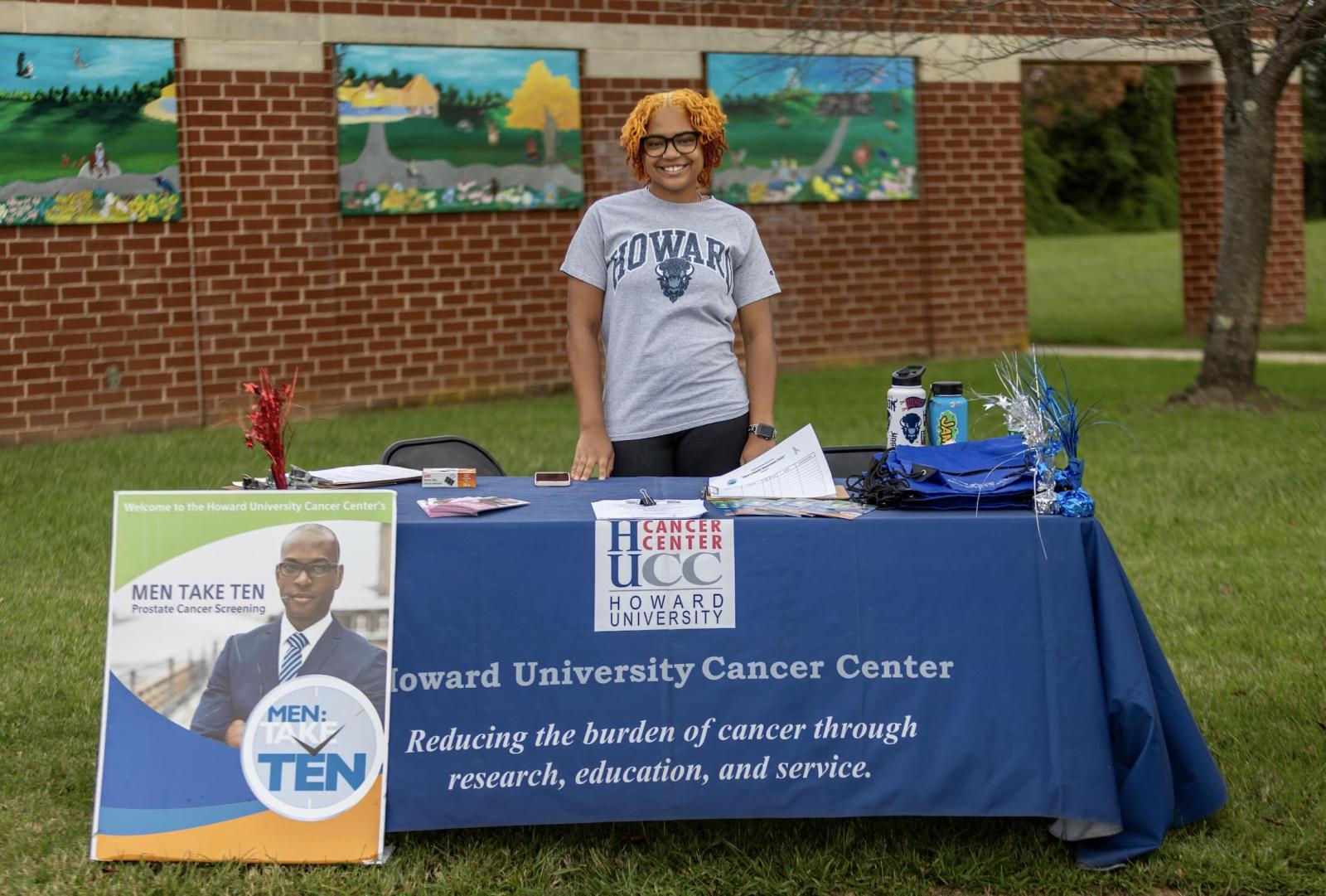
'It Could Save Your Life': Howard Students Serve at Cancer 5k
The Howard University Cancer Center’s outreach programs also serve as an important educational experience for Howard students, allowing them to connect classroom learning to real-world service. At this year’s walk, two sophomore chemistry majors — Jameel McDaniel and Heaven Devoe — volunteered their time to support the event.
McDaniel, an honors chemistry major from San Diego (and Cincinnati), is pursuing triple minors in biology, math, and Spanish.
“I volunteered with Howard’s Cancer Research Center because I wanted to be a part of something bigger than myself,” he said. “By getting outside and in the community, I feel like I’m making a difference through prostate cancer education and awareness.”
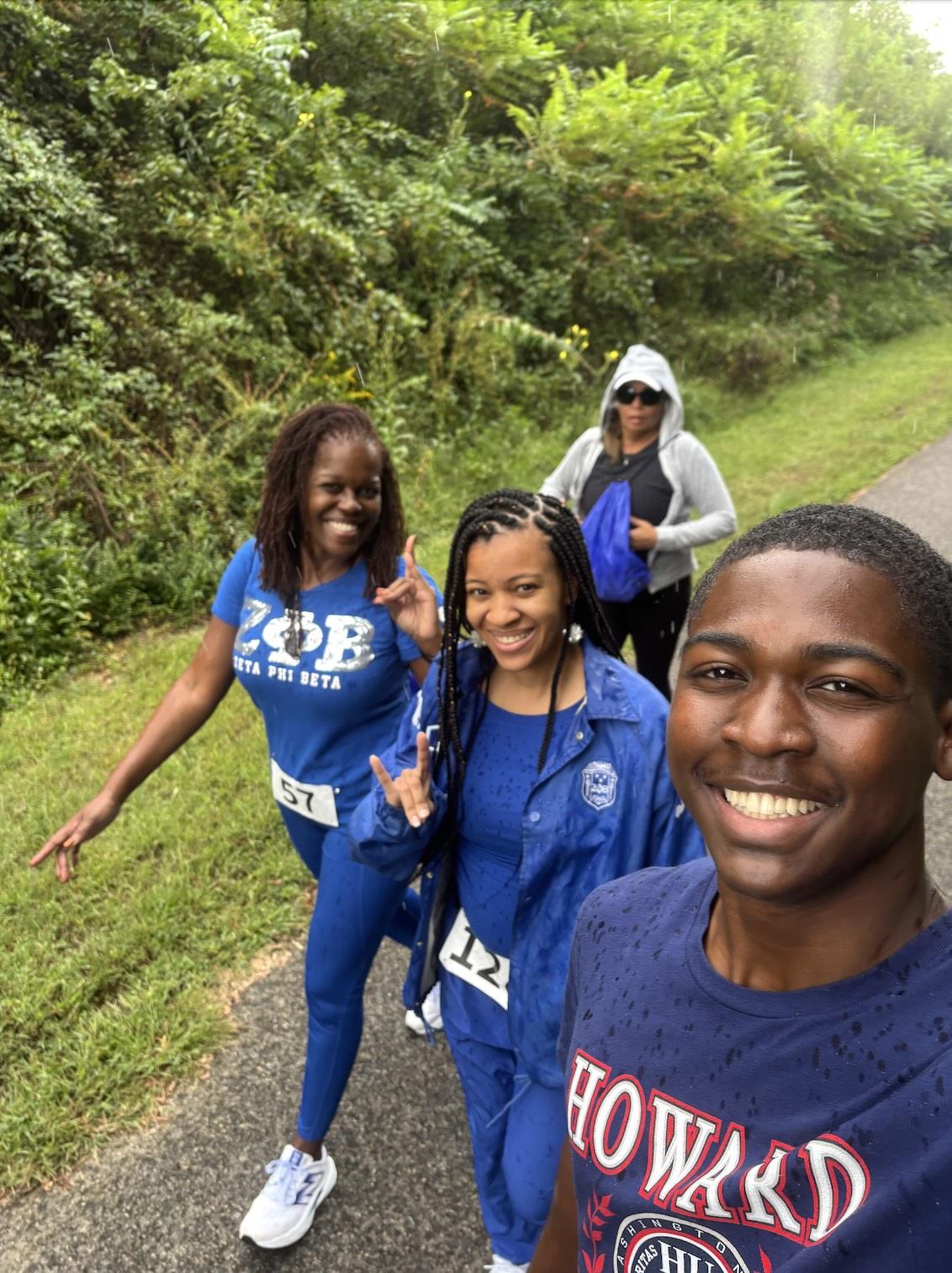
McDaniel aspires to become a surgeon spent time speaking with survivors at the event.
“I learned that it’s never too late to start thinking about one’s future and health,” he said.
Devoe is from Covington, Georgia, and said she dreams of becoming a neonatologist, pediatrician, or OB-GYN.
“I like to give back to my community, whether that’s through acts of service or just being a listening ear and a supporter,” Devoe said. At the walk, she helped participants sign up for Howard’s prostate cancer screenings.
“I learned that even when something seems scary or difficult, like getting screened, you should do it anyway. It could save your life,” she said. “I also learned that there’s always a community around you to support you along the way.”
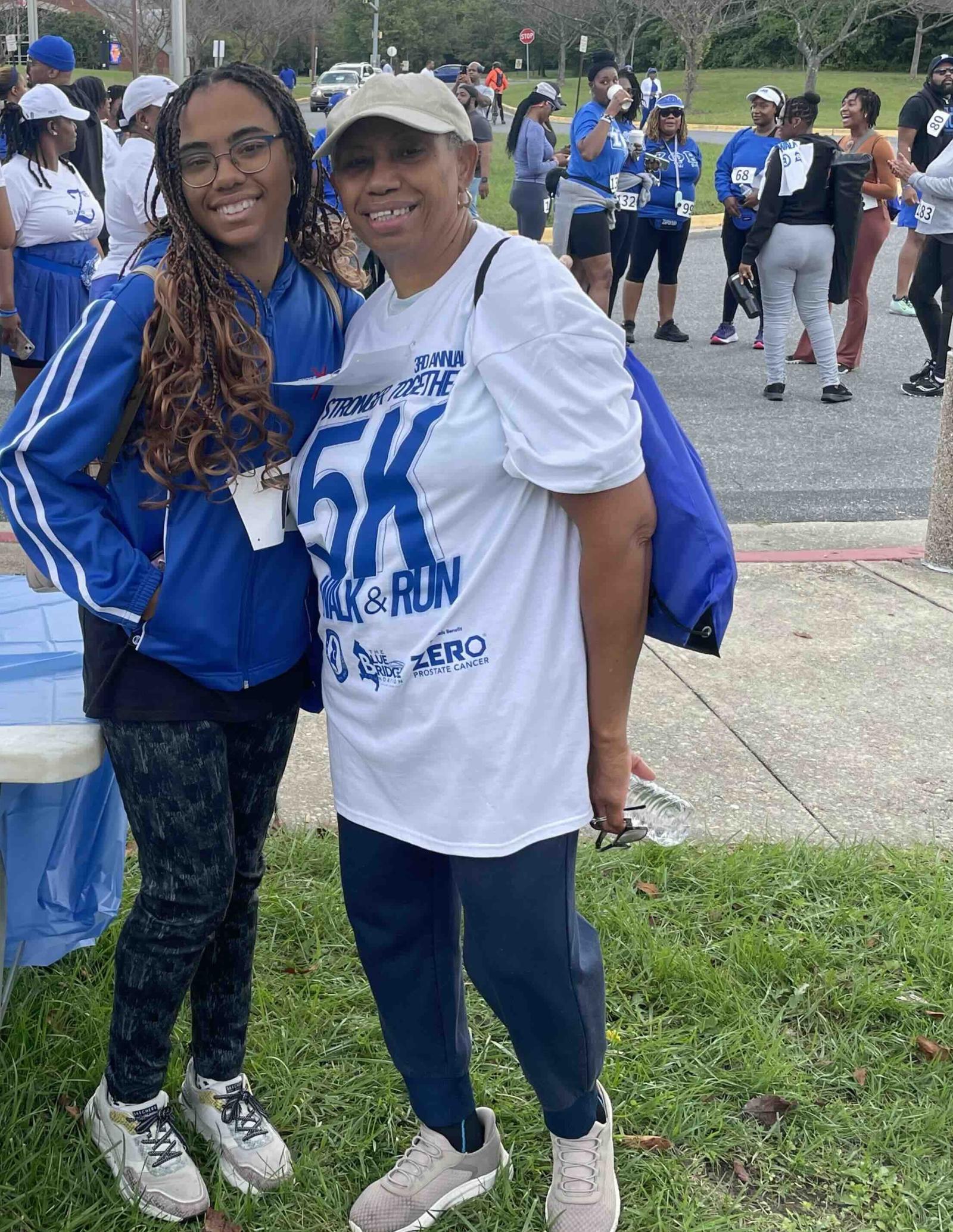
‘Prostate Cancer Is Taking Our Men’: A Wife’s Message After Loss
“I’m here in honor of my husband, Eddie Daniels,” said Karla Daniels of Pikesville, Maryland, who came out with her daughter, Venus. “He passed away in August 2024 from prostate cancer. He had been fighting the disease for eight years. In the last two years, it spread to his bones, and during the final eight weeks, it reached his brain.”
She continued, “We were together 26 years. He was an accountant, and he was very involved. He was a Sigma, and he truly enjoyed his fraternity and his brothers.”
Now Karla is focused on making sure other families don’t go through the same fight unprepared.
“Take the time to do it, especially if you have a family history of cancer. It could make all the difference,” she said. “My husband had a lot of cancer in his family. When he was first diagnosed, the doctors said it wasn’t aggressive, but later it metastasized to his bones.”
“Prostate cancer is taking our men. We need to get the word out — to prevent it or at least get the numbers down.”
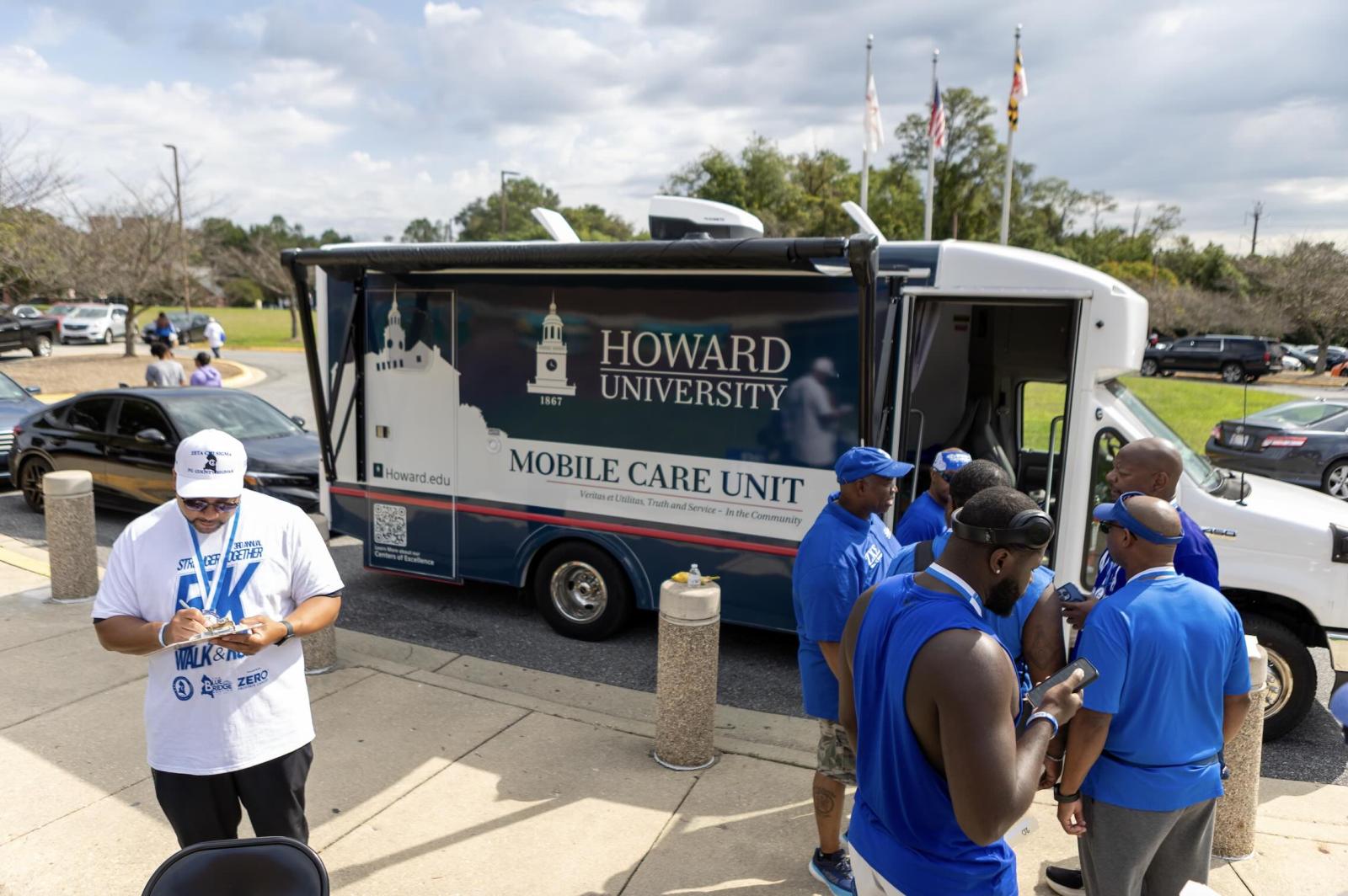
Howard’s Mobile Team Makes Prostate Cancer Screenings Accessible
At the Stronger Together Walk, Howard University’s Men Take Ten mobile screening team offered free PSA tests — making screening quick, accessible, and convenient for men who may otherwise not take the step to get tested.
The team is managed by Clinton Burnside, MPH, senior outreach coordinator at Howard University. Burnside said the program targets men ages 40 to 75, with outreach efforts particularly focused on Black men, who are more likely to be diagnosed with advanced-stage prostate cancer and face higher mortality rates.
Prostate cancer begins in the prostate gland, a small organ in men that produces seminal fluid. It can develop slowly, sometimes causing no symptoms, but in other cases it may progress aggressively. To catch cancers that are dangerous while still treatable, physicians emphasizes early detection via screening tools like the PSA test.
Burnside said Howard’s role goes far beyond a single day of testing. Our role includes reaching men where they are, to provide prostate cancer education & screenings, in addition to connecting men to support services and other men that can help guide them through the process. The Howard University Cancer Center has become a cornerstone for community outreach, developing relationships with local churches, fraternities, community and national organizations to fight disparities in prostate cancer outcomes.
“We’ve created trusted relationships in the community, and that’s what makes the difference,” Burnside said.
The goal, he said, is always the same: meeting Black men where they are.
“It’s really about promoting awareness,” he said. “Not just talking about prostate cancer, but offering the screenings, building partnerships, and making sure men get the care they need.”
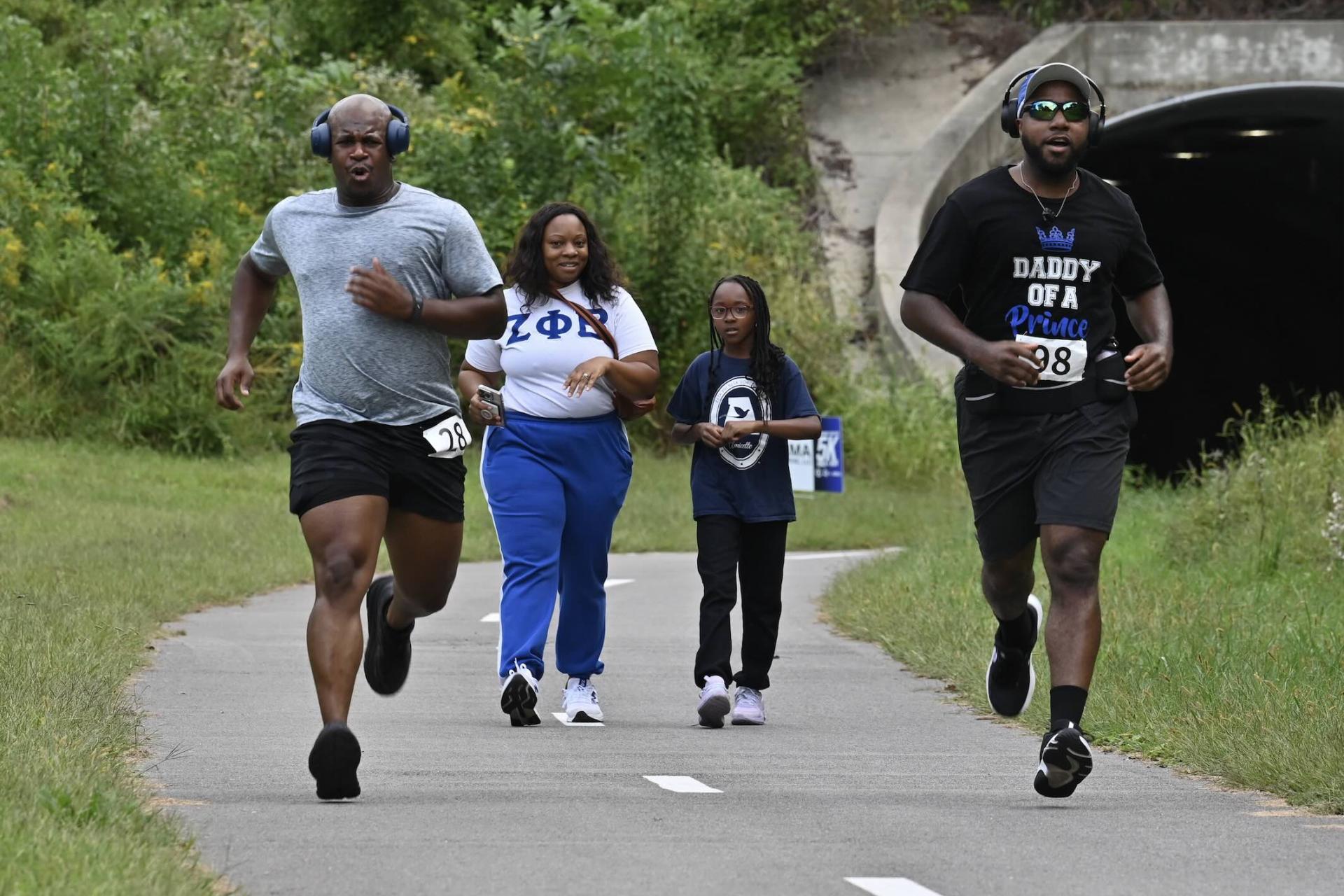
The PSA, or prostate-specific antigen, test is a simple blood test that can help detect prostate cancer early. Health experts recommend regular PSA screening for men ages 40 and older, and earlier for those with a family history of the disease. Learn more from the Prostate Health Education Network (PHEN), the nation’s leading prostate cancer education and advocacy organization.
For His Father and Fraternity, A Champion of Men’s Health
For Wes Lewis, immediate past president of Phi Beta Sigma’s Zeta Chi Sigma Chapter, this year’s partnership with the Howard University Cancer Center marked a new stage for the Stronger Together Prostate Cancer Awareness 5K Walk/Run, which he co-founded with Dr. Jarrod Best, his fraternity brother and co-chair.
“Howard was the level up we needed,” Lewis said. “They brought their mobile unit and offered real-time PSA screenings. We screened 31 men that day, including myself. You don’t have to wait until Monday to make an appointment — you’re here, go get screened.”
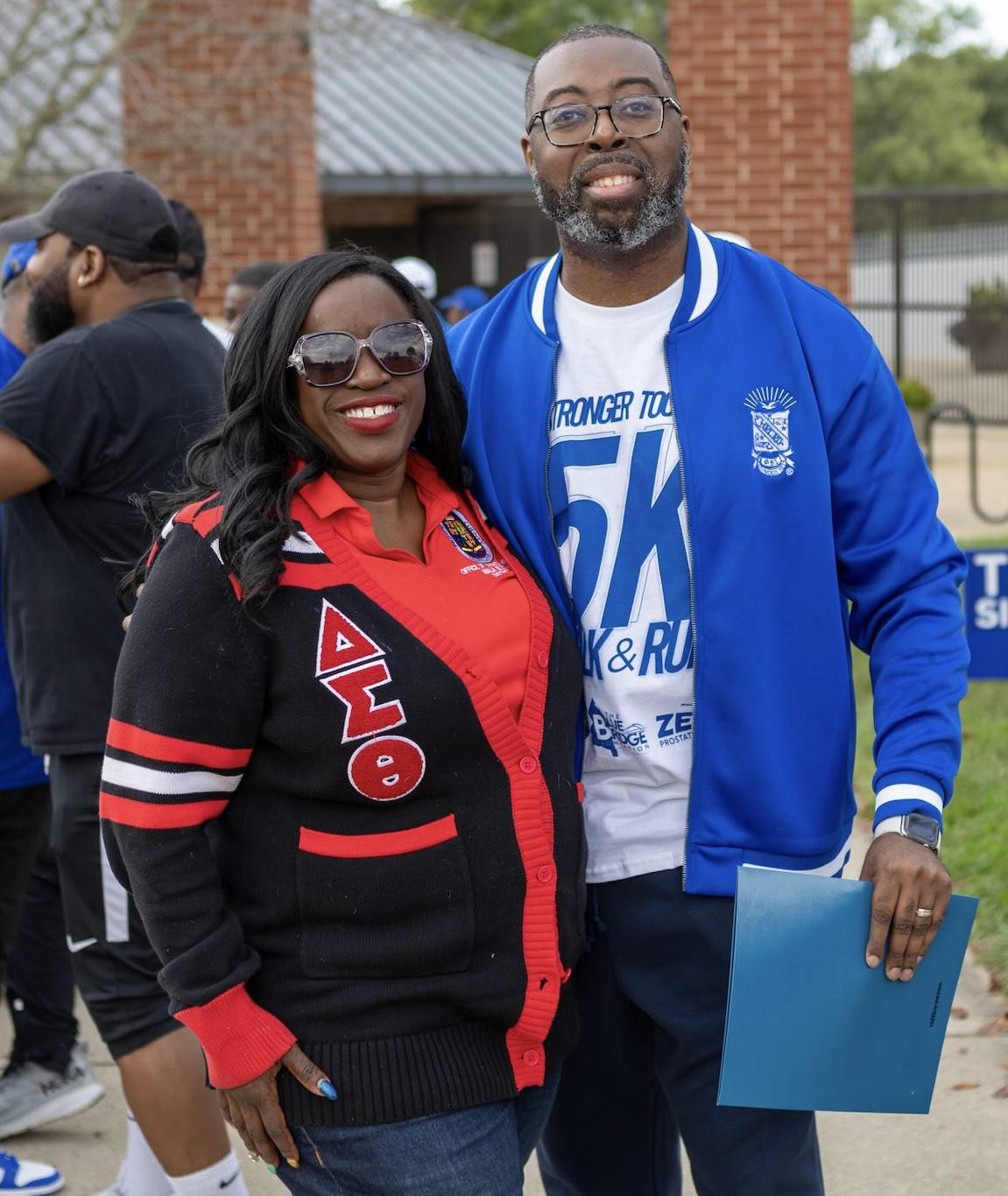
The partnership reflected the walk’s larger purpose: making health access direct and convenient. The Howard University Cancer Center’s on-site screening unit helped move the three-year-old event from a community gathering to a regional effort focused on early detection and prevention.
The Zeta Chi Sigma Chapter, established in 1978, serves the Prince George’s County, Maryland, and the Metro DC areas.
Since its launch, the walk has grown from roughly 50 participants in its first year to more than 200 in its second, and over 300 this year. That growth has come through strong partnerships with fraternities, sororities, churches, and civic groups across Prince George’s County. “If you were here last year, you know how much we’ve grown,” Lewis said. “Just look at the parking lot — it says it all.”
Lewis, 41, grew up in Prince George’s County and works in IT consulting while teaching as an adjunct professor. He started the walk after his father, Fabian Lewis — a Howard alumnus — was diagnosed with prostate cancer.
“My dad had his diagnosis about three years ago,” he said. “As president of our chapter, we were looking to create a signature service event. It made sense to focus on prostate cancer — it was personal, and it was relevant.”
Lewis described his father’s approach to his diagnosis as straightforward and disciplined. “He’s a straight shooter,” Lewis said. “He told me, ‘Hey, I went to the doctor. I have prostate cancer. I’m scheduled for surgery next week.’ That was it. He handled it.”
When planning the first walk, Lewis began reaching out to cancer centers across the D.C. area for partners. His connection with Burnside at the Howard University Cancer Center proved pivotal. “Prince George’s County has one of the largest Black populations in the region,” Lewis said. “The numbers for prostate cancer among Black men are what they are — it made sense to do the event here and to do it with Howard.”
Now in its third year, the Stronger Together Walk/Run continues to expand through organized partnerships and a clear focus on results.
“Every year, I look at how we can do better,” Lewis said. “I don’t want to always be the face of it. I want younger Sigmas to take ownership and build it further.”
Lewis has also been direct about one of the barriers that keep men from getting screened — the rectal exam.
“Let’s be real,” he said. “No man wants to do that, and I’m no different. Even if it saves your life, it’s not something you look forward to.” For that reason, he said, the chapter promoted PSA blood testing instead of the rectal exam to make sure men didn’t see screening as a deterrent.
“We wanted to take the excuses off the table,” Lewis said. “You ran your 5K, you’re standing right here — go get the blood test. It’s quick, it’s simple, and it could save your life.”
A Survivor’s Journey from Diagnosis to Advocacy
A prostate cancer survivor and ambassador for ZERO Prostate Cancer, Hugh Beckford used the walk to share how his diagnosis turned him into an advocate.
“You go to the doctor, he gives you the news, and then you walk out to your car and start bawling,” Beckford said. “I have two boys. That’s all I was thinking about.”
At the walk, he told his story of confronting prostate cancer. When he first started having trouble with something as ordinary as going to the bathroom, he didn’t think much of it. The discomfort led to a visit with his doctor — and a life-altering PSA test. The numbers were high. A biopsy confirmed the diagnosis: prostate cancer.
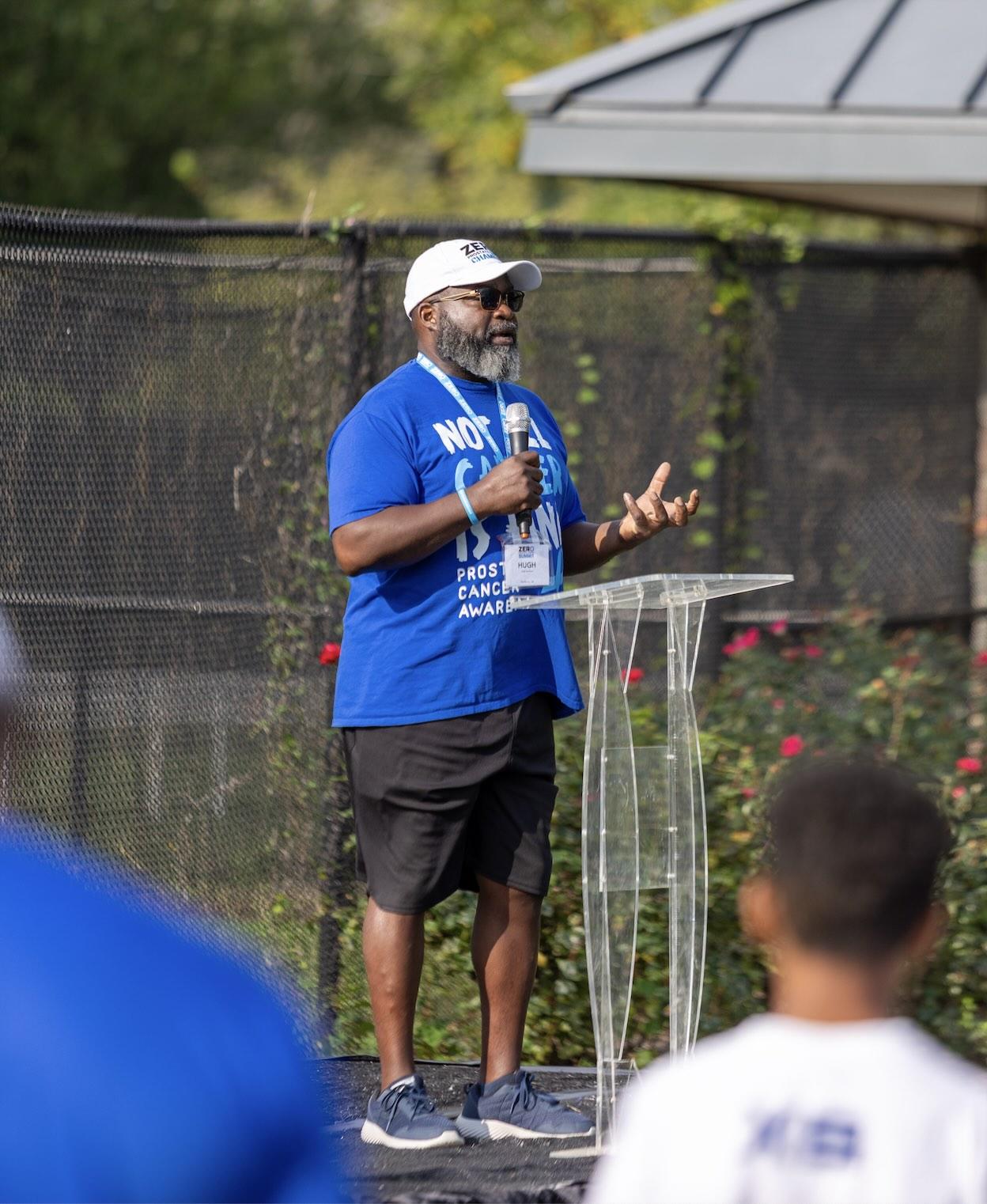
The diagnosis sent Beckford searching for answers. He began looking online for information and support and soon discovered ZERO Prostate Cancer, a national nonprofit focused on advocacy, education, and early screening. Just weeks after learning of his diagnosis, he attended the organization’s national conference at National Harbor. The experience, he says, transformed fear into action.
“When you hear the word cancer, you feel devastated,” Beckford said. “But going to that conference changed everything. The worst thing a man can do is stay silent until it’s too late.”
Now a leading voice for prostate cancer awareness, Beckford is pushing for earlier PSA testing and greater access for families with a history of cancer. His mission is to make sure no man faces prostate cancer alone.
Today, Beckford travels to community events and health fairs across the region, sharing his story and urging men to get screened. He has also become a vocal advocate for policy reform, calling for PSA testing to be more affordable and accessible.
“The test costs about $35,” he explained. “That might not sound like much, but for some people, that’s enough to keep them from getting tested. Nobody should die because of a $35 test.”
Beckford now mentors newly diagnosed men and connects them with support groups through ZERO’s national network.
“They’ll help you navigate your insurance. If you don’t have insurance, they’ll help you find other resources,” he said. “You never have to face it alone.”
For Beckford, the 5K was not about miles or medals — it was about movement, both physical and social.
“Howard being here matters,” he said. “Because when our men see a university like this showing up for them, it changes how they see their own health. It makes them believe they’re worth saving.”
Know the Symptoms, Get Screened, Save Lives
Prostate cancer often presents no early symptoms, making proactive screening essential. According to PHEN, men should be aware of potential warning signs, including:
- Difficulty urinating or a weak, interrupted flow
- Frequent urination, particularly at night
- Pain or burning during urination
- Blood in the urine or semen
- Persistent pain in the pelvis, hips, or lower back
PHEN stresses that any of these symptoms, especially for men over the recommended screening age, warrant immediate medical consultation.
Because symptoms may not appear until the disease is advanced, PHEN champions early detection through regular screening. This is particularly critical for Black men, who face significantly higher incidence and mortality rates. The goal is to identify cancer at its most treatable stage, often before any symptoms arise.
The primary screening tool is the Prostate-Specific Antigen (PSA) blood test. While some protocols also use a digital rectal exam (DRE), PHEN notes that many community programs focus on the PSA test to encourage broader participation. For diagnosed men, PHEN provides resources on advanced testing, treatment options, and clinical trials.
Beyond testing, PHEN encourages men to take an active role in their health by staying informed, attending community screening events, and partnering with trusted local organizations. If a test is abnormal, prompt follow-up is crucial. For survivors, PHEN offers long-term support through its Survivor Network, monthly meetings, and educational materials to manage treatment side effects.
###
Related Story
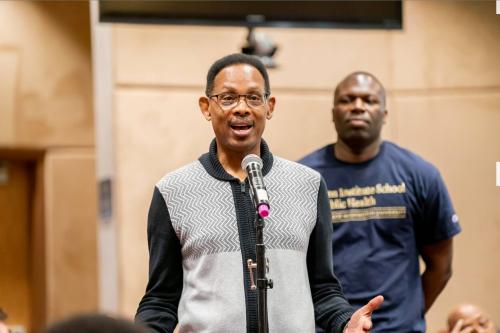
Keep Reading
-
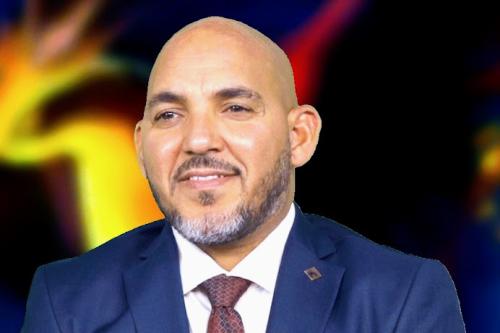
-
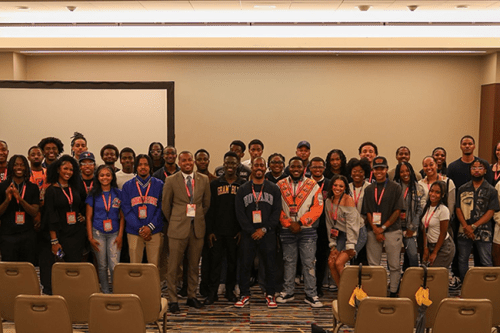 News
NewsFICO Invests in the Howard University and PNC Center for Entrepreneurship
Jan 28, 2026 3 minutes -
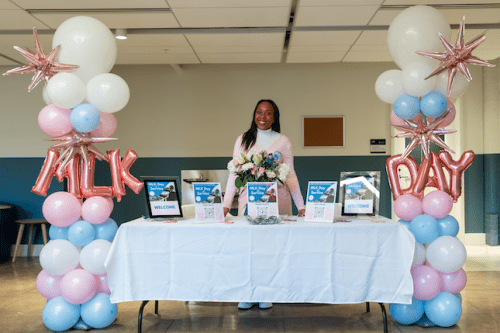 Uplift
UpliftService, Scholarship, and the Dream in Action: Howard University Inspires the Next Generation on MLK Day
Jan 23, 2026 2 minutes
Are You a Member of the Media?
Our public relations team can connect you with faculty experts and answer questions about Howard University news and events.
Submit a Media Inquiry

